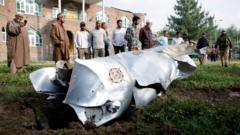Both nations are entrenched in a heated military confrontation, with accusations and retaliatory strikes directed at pivotal air bases and military installations.
Escalation in India-Pakistan Conflict: Military Bases Targeted in Retaliatory Strikes

Escalation in India-Pakistan Conflict: Military Bases Targeted in Retaliatory Strikes
Intensifying hostilities between India and Pakistan see both countries exchanging missile strikes amidst growing tensions.
The article text:
On May 10, 2025, the conflict between India and Pakistan experienced a significant escalation, as both countries conducted targeted strikes on military bases, accusing each other of initiating violence. Pakistan alleged that India attacked at least three of its air bases, including the Nur Khan air force facility near Islamabad, using air-to-surface missiles. Residents in Rawalpindi reported hearing multiple explosions and seeing a "large fireball" rising into the sky.
In response, the Pakistani military confirmed it launched short-range surface-to-surface missiles targeting several locations in India, such as the Udhampur and Pathankot air bases, as well as a missile storage site. The military emphasized that their actions were based on a principle of "an eye for an eye."
Conversely, India defended its actions by stating that it was responding to a series of Pakistani provocations that included attacks on 26 locations with drones, long-range weaponry, and fighter jets. Indian military spokeswoman Vyomika Singh reported "limited damage" at four air force bases while asserting that India was acting with "responsible and measured" tactics. India's foreign secretary, Vikram Misri, echoed this sentiment, holding Pakistan responsible for the escalating conflict.
As each side continues to exchange claims and counterclaims, it is evident that military engagement has surged, marking some of the most intense fighting since the armed confrontations began days earlier.
On May 10, 2025, the conflict between India and Pakistan experienced a significant escalation, as both countries conducted targeted strikes on military bases, accusing each other of initiating violence. Pakistan alleged that India attacked at least three of its air bases, including the Nur Khan air force facility near Islamabad, using air-to-surface missiles. Residents in Rawalpindi reported hearing multiple explosions and seeing a "large fireball" rising into the sky.
In response, the Pakistani military confirmed it launched short-range surface-to-surface missiles targeting several locations in India, such as the Udhampur and Pathankot air bases, as well as a missile storage site. The military emphasized that their actions were based on a principle of "an eye for an eye."
Conversely, India defended its actions by stating that it was responding to a series of Pakistani provocations that included attacks on 26 locations with drones, long-range weaponry, and fighter jets. Indian military spokeswoman Vyomika Singh reported "limited damage" at four air force bases while asserting that India was acting with "responsible and measured" tactics. India's foreign secretary, Vikram Misri, echoed this sentiment, holding Pakistan responsible for the escalating conflict.
As each side continues to exchange claims and counterclaims, it is evident that military engagement has surged, marking some of the most intense fighting since the armed confrontations began days earlier.


















